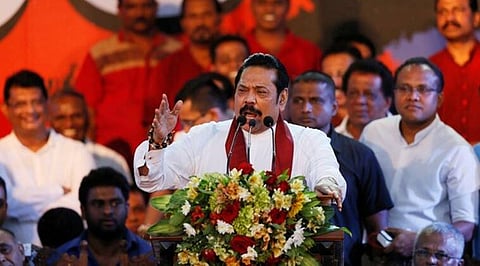

CHENNAI: Sri Lankan Prime Minister Mahinda Rajapaksa on Monday resigned amid the ongoing violent clashes in the island nation. This announcement came days after President Gotbaya Rajapaksa in a special meeting requested the Prime Minister to step down as a solution to the ongoing political crisis.
Here are a few things you need to know about the leader:
In his long political career, he served as President of Sri Lanka from 2005 to 2015 and from 2019 to 2022.
Born in 1945 in Weeraketiya, a town in southern Sri Lanka, he was the second of six brothers, three of whom are also in national politics, and three sisters. Rajapaksa did not pursue undergraduate studies, but he graduated from Colombo Law College with a law degree in 1974.
He was first sworn in as the president in November 2005 and re-elected for a second time in office in January 2010 and served in this post till January 2015. During his first term, he was well-known for his efforts to defeat the Liberation Tigers of Tamil Eelam (LTTE). He had served as the Labour Minister and Minister of Fisheries and Aquatic Resources during the initial years of his political career.
Later, he won the 2010 presidential election and his second term ended in 2015. However, Rajapaksa, who was accused of corruption in both previous elections, lost the 2015 presidential election to his former ally Maithripala Sirisena.
He was the Leader of the Opposition between December 2018 and November 2019 from Sri Lanka Podujana Peramuna (SLPP) party.
In 2019, Rajapaksa assumed power as the Prime Minister after his brother and former defence chief, Gotabaya Rajapaksa won the presidential election.
The Lankan crisis:
Emerging from the civil war in 2009, the island nation was rocked by Easter Sunday bombings in 2019 before being hit by the worst pandemic. This in turn toppled the inflow of tourists to the nation.
On April 1, President Gotabaya Rajpaksha declared a state of emergency. In less than a week, he withdrew it following massive protests by angry citizens over the government’s handling of the crisis.
The country relies on the import of many essential items including petrol, food items, and medicines. Most countries will keep foreign currencies on hand in order to trade for these items, but a shortage of foreign exchange in Sri Lanka is being blamed for the sky-high prices.
The last IMF loan to Sri Lanka was in 2016. The country received $1.5 billion for three years from 2016 to 2019. The conditions were familiar, and the economy’s health was nosedived over this period. Growth, investments, savings, and revenues fell, while the debt burden rose.
A bad situation turned worse with two economic shocks in 2019. First, there was a series of bomb blasts in churches and luxury hotels in Colombo in April 2019. The blasts led to a steep decline in tourist arrivals – with some reports stating up to an 80 per cent drop – and drained foreign exchange reserves. Second, the new government under President Gotabaya Rajapaksa irrationally cut taxes.
In April 2021, the Rajapaksa government made another fatal mistake. To prevent the drain of foreign exchange reserves, all fertilizer imports were completely banned. Sri Lanka was declared a 100 per cent organic farming nation. This policy, which was withdrawn in November 2021, led to a drastic fall in agricultural production and more imports became necessary.
Because there is less food and other items to buy, but no decrease in demand, the prices for these goods rise. In February 2022, inflation rose to 17.5 per cent.
Now, the country defaulted on its foreign debts for the first time since its independence, and the country’s 22 million people are facing crippling 12-hour power cuts, and an extreme scarcity of food, fuel, and other essential items such as medicines.
Visit news.dtnext.in to explore our interactive epaper!
Download the DT Next app for more exciting features!
Click here for iOS
Click here for Android